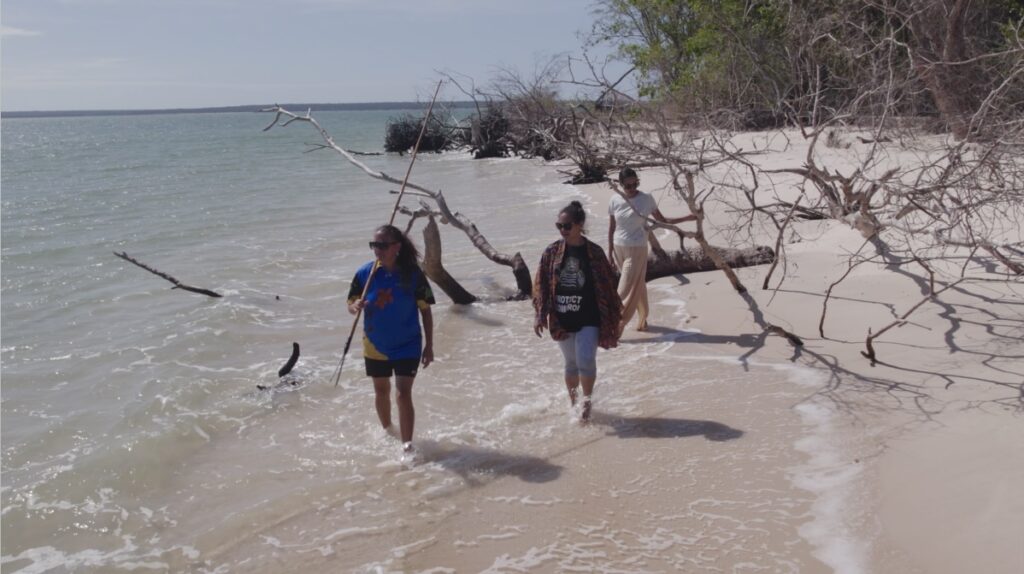29 January 2023
Australia’s second biggest gas company, Santos, is able to proceed with its $5.7 billion offshore Barossa gas project, following a Federal Court decision earlier this month.
Barossa is located in the Timor Sea north of Darwin and the Tiwi Islands, and has been staunchly opposed by Tiwi Islands Traditional Owners for years. A spokesperson for the Munupi clan of the Tiwi Islands has stated that “Munupi people don’t want any fossil fuel activities off the coast line of the Tiwi Islands.”
The project has been delayed for almost sixteen months after a successful legal challenge from Tiwi Islands Traditional Owners in the Federal Court saw Santos’ environmental approvals for the project revoked. Santos has increased the cost of Barossa by US$300 million as a result of the delays.
However, the Federal Court of Australia ruled against a legal challenge by Tiwi Islands Traditional Owners to the construction of the Barossa gas pipeline, effectively enabling Santos to go ahead with the entire project.
Santos has announced that it will recommence laying its pipeline, and despite over a year of delays, has made only a minor revision to its schedule for Barossa, having recently announced to investors it is targeting first gas in the third quarter of 2025.
Support Traditional Owners: Take Action
Tiwi Islanders human rights complaints with Australia’s big four banks
With Barossa cleared to proceed by regulators, the heat is on the banks and financial institutions funding the project to take responsibility for First Nations human rights.
In April last year, Tiwi and Larrakia Traditional Owners filed human rights complaints alleging that the big four Australian banks – ANZ, Commonwealth Bank, NAB and Westpac – and a host of international financiers breached their human rights commitments by participating in a $1.5 billion loan related to Santos’ destructive Barossa gas project.
Appallingly, the banks loaned to Santos while Tiwi Islands Traditional Owners were challenging deeply flawed consultation processes for Barossa in the Federal Court, meaning they must have known of Traditional Owners’ opposition to the destructive gas project and decided to refinance the loan anyway.
Will you hold the banks to account?

First Nations Campaigners Antonia Burke, Miah Wright and Karra Kinchela observe the Tiwi coastline and Sea Country that will be affected by the impacts of Santos’ destructive, carbon-intensive Barossa Gas field.
Australia’s big four banks all have policies requiring them to act in line with international human rights standards.
These policies either include a direct commitment to the principle of ‘free, prior and informed consent’ (FPIC) or refer to the UN Declaration on the Rights of Indigenous Peoples, of which FPIC is a key principle.
Initially, CommBank, NAB, and Westpac all effectively dismissed the requests in Traditional Owner’s human rights grievances without any engagement. ANZ is still yet to formally respond.
In hopeful news ANZ, CommBank and Westpac CEOs have since all agreed to a dialogue with Traditional Owners on Tiwi country.
The appalling dismissal of the grievances led to Tiwi Islands Traditional Owners travelling thousands of kilometres at the end of last year to confront the boards of NAB and Westpac at their AGMs.
Their impassioned addresses to the board of Westpac drew a commitment from CEO, Peter King to visit Tiwi and discuss the human rights complaint. NAB did not make any commitments, and is now embarrassingly the only big four Australian bank yet to commit to a dialogue on country with the Tiwi Islanders.
Worryingly, Santos may now once again start looking for funding for its Darwin LNG project, which will process gas from Barossa.
Given they have funnelled billions to Santos since the signing of the Paris Agreement the big four Australian banks could firmly be in its sights for this funding.
